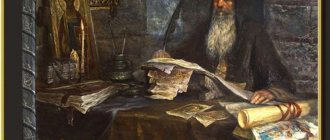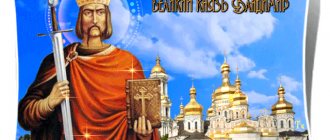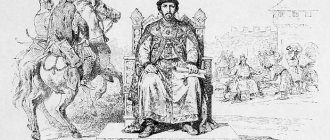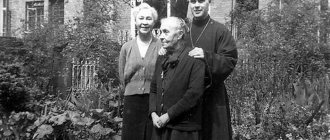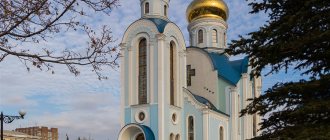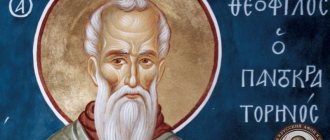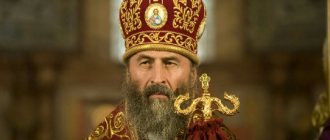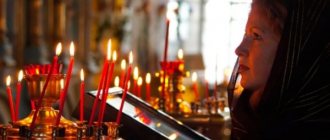| Date of birth : January 30, 1949 |
| Education : Leningrad Theological Academy (1976) |
| Titles and regalia : candidate of theological sciences |
| Website : https://www.vladyka-ionafan.ru/ |
Archbishop Jonathan (in the world Anatoly Ivanovich Yeletskikh)
- bishop of the Russian Orthodox Church; ruling bishop of the Tulchin diocese of the Ukrainian Orthodox Church (Moscow Patriarchate). Spiritual composer, translator of liturgical and spiritual texts.
Biography[edit]
Born on January 30, 1949 in the village of Shtalovka, Voronezh (now Belgorod) region, in the family of a teacher, a WWII veteran, and later a serviceman - lieutenant colonel of the Soviet Army. According to family legend, his father’s distant ancestor was one of the military leaders of the Battle of Kulikovo, and Archbishop Jonathan’s mother, on her father’s side, came from the clan of Bryansk Old Believers, and on her mother’s descending family branch, from the Vladimir province.
He spent his childhood in the city of Severomorsk, Murmansk region.
In 1960, my father was transferred to serve in the Kiev Military District, the whole family moved to Kiev, where, secretly from his parents, in a private house he was baptized by priest Alexei Glagolev, known for hiding Jews during the years of Nazi occupation.
After graduating from high school in 1966, he served in the Soviet army.
In 1970, Anatoly Yeletskikh entered the Leningrad Theological Seminary, and then in 1973-1976. to the Leningrad Theological Academy, studying at the same time in the regency class. The young seminarian does a lot of singing and often visits the rehearsal hall of the Academic Chapel named after. Glinka. He becomes close to the informal circle of avant-garde artists (Tatyana Glebova, Valentina Solovyova, etc.). He attends private exhibitions of their paintings, which was considered dangerous in those days.
In 1976, Metropolitan Nikodim (Rotov) of Leningrad and Novgorod tonsured him into monasticism with the name Jonathan; ordained to the rank of hierodeacon.
In 1978, Bishop Kirill (Gundyaev) of Vyborg, rector of the Leningrad Theological Academy, ordained him a hieromonk.
He graduated from the Academy with a candidate of theology degree and was retained as a professor's fellow. For several years he taught church singing at the Seminary and in the regency class, and also served as the regent of the choir of the Leningrad Theological Schools. In 1986, this choir, under his direction, recorded a gramophone record, where Jonathan’s original works were voiced for the first time.
He was accused by the KGB of distributing the banned book “The Gulag Archipelago” by Alexander Solzhenitsyn among seminarians and was deprived of his temporary Leningrad registration. He resigned from the position of teacher of church singing and director of the student choir with gratitude from the Academic Council of the Theological Academy and Seminary - “for many years of work.” For a long time I could not find a new place of ministry in the Leningrad region due to the obstacles caused by the KGB.
Later he became a cleric of the Vladimir Cathedral in Kyiv. With the blessing of Patriarch Pimen, he became Bishop of Pereyaslav-Khmelnitsky, vicar of the newly opened Kiev Pechersk Lavra, then manager of the affairs of the Ukrainian Orthodox Church of the Moscow Patriarchate. He ruled a number of dioceses (Glukhov, Sumy, Kherson).
Currently, he is the metropolitan, the ruling bishop of the Tulchin diocese, in which he finished composing the widely known “Chernobyl Liturgy”, performed in a symphonic-choral version in Kiev, Minsk, Nizhny Novgorod, Novosibirsk, Vinnitsa and other cities. He composed the “Liturgy of Simple Chant,” a series of liturgical chants on the melody of Gregorian chant for foreign parishes of the Moscow Patriarchate with local parishioners who converted to Orthodoxy. Defines himself as a Russian church composer, which is reflected in the Orthodox Encyclopedia.
JONATHAN
(Eletskikh Anatoly Ivanovich; born 01/30/1949, the village of Shatalovka, Shatalovsky district, Voronezh region, now Stary Oskolsky district, Belgorod region), Metropolitan. Tulchinsky and Bratslavsky, Russian. spiritual composer, poet, translator of liturgical texts. Since 1965, Anatoly sang and read in the choir of the Vladimir Cathedral in Kyiv. In 1966 he graduated from high school, in 1968-1970. served in the army. In 1970-1972 studied at the Leningrad DS, served as subdeacon under Metropolitan. Leningrad and Novgorod Nikodim (Rotov), at the same time studied in the choir director class at the Leningrad DA (headed by Prof. N.D. Uspensky), received a certificate in the specialty “choir director” (1974). In 1972-1976. studied at the Leningrad DA, in September. In 1975, he began working there as a director of the right choir and a teacher of church singing.
Jonathan (Eletskikh), Archbishop. Tulchinsky and Bratslavsky. Photo. 2007 Jonathan (Eletskikh), archbishop. Tulchinsky and Bratslavsky. Photo. 2007 Upon graduation, he continued to work as a teacher and choir director. 5 Apr. 1977 Met. Nicodemus tonsured into monasticism with the name Jonathan in honor of St. right Jonathan, son of King Saul, April 16. He was ordained a deacon by him. 24 Dec 1978 Ordained a priest by the rector of the Leningrad DA and DS Archbishop. Vyborg Kirill (Gundyaev; now Patriarch of Moscow and All Rus'). 13 Nov 1980, after defending a course work. “The religious and moral teaching of St. Theodore the Studite,” I. received a Ph.D. theology. On Dec. 1986 was accused of distributing among seminarians the banned book by A. I. Solzhenitsyn “The Gulag Archipelago”. In Jan. In 1987, he was relieved of his position as a teacher and regent of the Leningrad DA and DS and deprived of his temporary Leningrad residence permit.
Since June 1987, cleric of the Vladimir Cathedral in Kyiv, since Aug. 1987 - Holy Protection Church on Priorka. Since June 23, 1988, in the rank of abbot, he served as vicar of the returned Church of the Kiev Pechersk Lavra in honor of the Dormition of the Blessed Virgin Mary. Oct 11 In 1988, he was elevated to the rank of archimandrite, and the next day he was approved as viceroy of the Lavra (he held this position until Aug. 22, 1989).
By the Decree of the Holy Synod of the Russian Orthodox Church on April 10. 1989 I. was determined to be Bishop of Pereyaslav-Khmelnitsky, vicar of the Kyiv diocese. Apr 23 In 1989, in the Kiev Vladimir Cathedral, I. was consecrated as a bishop. At the same time, he began to combine the position of governor of the monastery with the obedience of the manager of the affairs of the Ukrainian Exarchate. I. resumed traditions in liturgical practice. Kiev-Pechersk everyday life (see Kiev-Pechersk chant), was engaged in the restoration of destroyed churches, monastery and seminary buildings.
On Nov. 1990, at the 1st Council of the Ukrainian Orthodox Church (UOC), I. spoke out against the lifelong tenure of Metropolitan. Filaret (see Denisenko; subsequently excommunicated from the Church) as Primate of the UOC in connection with the latter’s policy of separating the Ukrainian Church from the Moscow Patriarchate and was the only one who voted against the edition of the Charter of the UOC proposed by Filaret. He was removed from his post as manager of the affairs of the UOC. Apr 23 1991, on the basis of false testimony, I. was banned in absentia from the priesthood. On June 3, 1991, he submitted a report-appeal to Patriarch Alexy II, in which he rejected all accusations against him and accused Metropolitan. Philaret in schismatic activities, in violation of the monastic vow of celibacy, in lust for power and cruelty towards subordinates. On Sept. In 1991, at an emergency meeting of the “Filaret” Synod of the UOC, I. was defrocked “for unrepentance.” In April In 1992, to counteract the autocephalous schism, he organized the Committee of Clergy and Laity in Defense of Orthodoxy in Kyiv. Under conditions of information blockade surrounding events in the UOC, he published and distributed leaflets exposing the separatist plans of Metropolitan. Philaret and the schismatic autocephalists. Took an active part in organizing and holding April 30th. 1992 in Zhitomir Meetings of bishops, clergy, monastics, representatives of the Orthodox Church. brotherhoods and laity of the UOC, was the author of the draft statement, against which canonical charges were first brought against Metropolitan. Philaret (slander of the Council of Bishops and perjury).
Aug 25 1992 The Holy Synod of the UOC, chaired by the new Primate of the UOC, Metropolitan of Kyiv and All Ukraine Vladimir (Sabodan), recognized that the deprivation of I. of the bishop's rank had no canonical grounds and is invalid. In 1992, I. was appointed Bishop of Belotserkovsky, vicar of the Kyiv diocese. In 1993-2000 was again the manager of the affairs of the UOC, a permanent member and secretary of the Holy Church. Synod of the UOC.
29 Dec 1993 appointed bishop of the newly formed Glukhov and Konotop (now Konotop) diocese (Sumy region, Ukraine). He achieved the return of the famous Glinskaya Church in honor of the Nativity of the Most Holy Theotokos to the male hermitage and became its holy archimandrite. On July 28, 1994 he was elevated to the rank of archbishop.
From 27 Aug. 1995 I. - manager of the Sumy and Akhtyrka diocese of the UOC. Restored the Sumy Pastoral and Theological School.
Since Apr. 1999 I. - Bishop of Kherson and Tauride. Together with the rectorate of the Kherson State. The university established international scientific readings on church historical topics. Organized the annual summer Orthodox service in the diocese. children's camp "God's Bee", Orthodox meetings. and Evangelical Lutheran youth in Augsburg (Germany) and Kherson. In 2004-2006 in the Cathedral of the Holy Spirit in Kherson practiced the ministry of the so-called. missionary liturgies with the reading of Eucharistic prayers in Russian. or Ukrainian languages and with a brief explanation of the rites of the liturgy. Oct 10 In 2005, together with the clergy of the diocese, he addressed an open letter to the President of Ukraine V. A. Yushchenko with a demand to abandon government interference in the internal life of the UOC and to stop the government. the policy of forcibly separating the UOC from the Moscow Patriarchate, with protest against anti-canonical attempts to create a “single national local Orthodox Church” in Ukraine.
22 Nov 2006 I. was appointed Archbishop of Tulchin and Bratslav.
Aug 28 2014 at the Liturgy in the Kiev Pechersk Lavra, Metropolitan. Onuphrius elevated him to the rank of metropolitan of Kiev and all Ukraine.
Member of the commission St. Synod of the Russian Orthodox Church on interaction with Old Believer parishes of the Russian Orthodox Church and Old Believers. Member of the Theological Commission and the Commission for the Canonization of Saints (until 2007) Priest. Synod of the UOC.
I. is the author of numerous spiritual music. compositions and arrangements (more than 1600 pages of musical text), some of them were published by the Moscow Patriarchate Publishing House, the Musical Ukraine Publishing House, Orthodox (Moscow), the Kherson State Publishing House. University, municipal chamber choir “Kyiv”, etc. The most famous music. works by I.: arrangements of “Stateful antiphons of the matins of ancient chants”, “God is with us” from the Solovetsky chant, “Now the powers of heaven” from the Valaam chant, “You who are clothed” from the chant of the Kiev Pechersk Lavra, as well as original compositions “Thy Chamber”, “Flesh” falling asleep." For the first time in the Russian Orthodox Church, I. used the melodic elements of ancient Gregorian chant (“Liturgy of Peace”), as well as the melodies of well-known Evangelical Lutheran hymns (songs of communicants with words by I.) to write liturgical chants. I. is the author of the “Chernobyl Liturgy”, dedicated to the memory of the heroes-liquidators of the consequences of the disaster at the Chernobyl nuclear power plant in Ukraine, and the “Voice Liturgy” for public singing, which is based on everyday chants of church osmoglasiya.
Multiple member of the jury of the International Festival of Church Music in Hajnowka (Poland). I. gave lectures in Russian. music semiography and history of Russian. liturgical singing in Friborg Catholic. University (Switzerland) and for the Russian community. Orthodox c. St. Nicholas in Amsterdam (2004-2006).
Author of 4 transcriptions into Russian. language (including metrhythmic) of the Great Canon of St. Andrei Kritsky, “An Explanatory Guide to the Divine Liturgy” - an educational textbook for general education with an extensive historical and theological commentary and a presentation of prayers for the sacrament of the Eucharist in Russian. and Ukrainian languages, articles on liturgics and church music.
Awarded church orders of St. Sergius of Radonezh, St. blgv. book Daniel of Moscow, St. Seraphim of Sarov (ROC), St. Anthony and Theodosius (UOC), St. ap. and Evangelist John the Theologian (UOC), St. Mark (Jerusalem Patriarchate), etc.
Awarded the Russian Order of Friendship for strengthening relations between Russia and Ukraine.
Works: On the origins of the birth of the Ukrainian Orthodox Church // Orthodox Tavria: [Diocese. newspaper]. Kherson, 2002. No. 5(44): June. pp. 8-9; No. 7(46): July. pp. 1-8 (Electronic version: www.vladyka-ionafan.ru/articles/510); The Penitential Great Canon of St. Andrei Kritsky: Four experiences translated into Russian. language for spiritual and edifying reading. Kherson: Kherson State Publishing House. University (hereinafter referred to as IKGU), 2003, 2006 2; An explanatory guide to the Divine Liturgy of St. John Chrysostom: Prayer Books, brief commentary, historical theology. articles. Kherson: IKHGU, 2003; An explanatory guide to the Divine Liturgy of St. Basil the Great: Prayer books, brief commentary, historical and theological. articles. Kherson: IKHGU, 2003; Open letter from the clergy of the Kherson diocese of the UOC to the President of Ukraine V. A. Yushchenko (October 7, 2005) // www.patriarchia.ru/db/text/52465.html [Electr. resource]; Venerable Theodore the Studite, mentor of monasticism, defender of icon veneration. Kherson, 2006; Tlumachny traveler with Divine Liturgy: (Updated view). K., 2008; An explanatory guide to the Divine Liturgy: Eucharistological work, the experience of presenting the Divine Liturgy of Saints John Chrysostom and Basil the Great in Russian. language from cr. history-theology commentary, prayers to St. communion, eucharistological articles. M.; K., 2008; About the ancient collision of monastic and secular views on church hymnography using the example of the worthy of the Nativity of Christ // www.religion.in.ua/main/history/2463-kolliziya-monasheskogo-i-mirskogo-v-odnom.html [Electr. resource]; the same // Cephas. 2009. No. 11(101) (electronic version: gazetakifa.ru/content/view/2951/25); About the experience of serving the missionary Liturgy // www.otechestvo.org.ua/main/200912/1507.htm [Electr. resource].
Music Op.: “Christ is born”: Solemn irmos of the Nativity of Christ, Kyiv. disp. K.: Musical Ukraine, 1993; Sedate antiphons of Matins of ancient chants. K.: Musical Ukraine, 1994; Degree, antiphon 1st [8 voices] // Hymns of the Sunday Service. M.: Life-Giving Source, 1996. Voice 1. P. 18-19; Voice 2. pp. 21-24; Voice 3. pp. 26-27; 1997. Voice 4. pp. 29-31; 1998. Voice 5. pp. 27-28; Voice 6. pp. 37-39; Voice 7. pp. 28-29; 1999. Voice 8. pp. 31-33; Orthodox church choirs: Op. and transl. K.: Musical Ukraine, [1996]; Selected op. and transl. for a little laugh. choir. M.: Life-Giving Source, 1997; “For you to dress” dispensation. Kiev-Pechersk Lavra // Hymns of Holy Week. M.: Life-Giving Spring, 1999. Part 2: Great Heel. P. 93; The same // Sunday services of the Lenten Triodion. M.: Pilgrim, 2000. P. 156; Liturgy for the World (“De Angelis”). K., 2003. (B-chamber choir “Kiiv”); Liturgy of Peace (“De Angelis”): Choral score. Kherson, 2003; Chornobyl liturgy: Choral score. Kherson, 2003; "Hosanna": Collection. spiritual-music translated and op. Kherson: IKHGU, 2004; “We’ll sing to you”: [Sat. spiritual-music translated and op.]. Kherson: IKHGU, 2005; Irmos of the Great Canon (according to the melody from the Psalmist's Companion), tone 6: For laughter. choir // Great Canon of St. Andrey Kritsky. M.: Publishing house. Council of the Russian Orthodox Church, 2006. pp. 11-19. (Triodion of church singing); The same: For 3 homogeneous voices // Ibid. pp. 19-27; “My soul”, tone 6 we know. disp. // Ibid. pp. 87-89; “God is with us,” chant of the Solovetsky Monastery // Great Compline / Ed.-comp. A. Burenina; ed. N. Gryzlova. M.: Publishing house. Council of the Russian Orthodox Church, 2006. pp. 16-17. (Triod of church singing. Weekly services of Great Lent); “Now are the powers of heaven,” chant of the Valaam Monastery // Liturgy of the Presanctified Gifts / Ed.-comp. A. Burenina; ed. N. Gryzlova. M.: Publishing Council of the Russian Orthodox Church, 2006. pp. 47-48. (Triod of church singing. Weekly services of Great Lent); “Glory to Thee, our God” we know. disp. // Wedding. M.: Publishing house. Council of the Russian Orthodox Church, 2006. P. 11. (Usage of church singing. Sermons of the Trebnik); “Thou hast placed crowns on their heads”: I know the Prokeimenon. schedule, tone 8 // Ibid. pp. 14-15; “Isaiah, rejoice”: Troparion at the wedding, 5th tone of the sign. disp. // Ibid. pp. 29-31; Lyra: Fav. spiritual-music op. and transl. Kherson, 2007; The deserving people of various chants, arranged by the archbishop. Jonathan (Eletskikh) // Zadostoyniki: At 4 o'clock. M.: Publishing house. Council of the Russian Orthodox Church, 2008. Part 2. pp. 5-17; Chernobyl Liturgy: Choral Score. Kherson, 2009 (in Church Slavonic language); Voice Liturgy: Choral Score. Kherson, 2009.
Creativity[edit]
Archbishop Jonathan is the author of church compositions and transcriptions of spiritual hymns, included in the collections “Christ is Born” (1993), “State Antiphons of Matins” (1994) and “Orthodox Church Choirs” (1995). Some of the compositions and transcriptions were recorded on the CD “Traditional and new hymns of the Orthodox Church.” Some other spiritual and musical compositions of Archbishop Jonathan were also published and recorded on CDs: “The Powerful Antiphons of the Ancients” (E minor), “Thy Chamber” (C minor), “The Flesh Asleep” (A minor), “Now the Power heavenly”, Valaam chant, “God is with us”, Solovetsky chant, (G minor), “Open the doors of repentance” zn.r. (B-flat major), “My Soul Magnifies the Lord” (D minor), “Chernobyl Liturgy”, etc. Jonathan released a CD with a sound recording of his “Liturgy of Peace”, in which the hymns of the Orthodox Liturgy of St. John Chrysostom were sung to the tune of Gregorian chant.
The musical research activities of Archbishop Jonathan are complemented by the search for little-known spiritual works of the post-revolutionary period and Ukrainian monodies of the 16th-14th centuries, the purpose of which is to preserve the spiritual heritage of Orthodox culture.
The scientific and literary activity of Archbishop Jonathan is represented by a candidate's dissertation, which traces the life and work of the Byzantine champion of Orthodox icon veneration of the 9th century, Ven. Theodore the Studite, poems on religious themes. He is the author of a number of articles that were published in the church press in Ukraine and abroad.
In 2003, the archbishop completed a five-year work of translating into Russian the extensive spiritual poem of the 7th century - the Penitential Great Canon of St. Andrey Kritsky. The canon was published by the publishing house of Kherson State University with the assistance of the rector, Professor Yu. I. Belyaev.
In 2004, the publishing house of Kherson State University released an extensive collection of sheet music “Hosanna”, which included his spiritual and musical arrangements, original compositions, patriotic hymns and poems, and in 2005 an expanded and corrected edition of this collection by the author, entitled “Lyre” in two parts with the inclusion of little-known choral concerts by V. Fateev, a student of Rimsky-Korsakov.
The same publishing house published the “Explanatory Guide to the Prayer Books of the Divine Liturgy of Saints John Chrysostom and Basil the Great” with experience in presenting the prayer books of the Liturgy in Russian and Ukrainian, with a large historical and theological commentary and a number of Eucharistic articles by famous theologians.
Awards[edit]
- Order of the Holy Apostle and Evangelist Mark (from the Jerusalem Orthodox Church)
- Order of the Holy Blessed Prince Daniel of Moscow, II degree (from the Russian Orthodox Church)
- Order of St. Sergius of Radonezh, II degree (from the Russian Orthodox Church)
- Order of Saints Anthony and Theodosius of Pechersk, 1st degree (from the Ukrainian Orthodox Church).
- Order of Saint Equal-to-the-Apostles Prince Vladimir, II degree: awarded on January 31, 2009 by Metropolitan Kirill (Gundyaev), elected and named Patriarch of Moscow and All Rus', “in consideration of his works and in connection with the 60th anniversary”
- Order of the Holy Apostle John the Theologian (UOC) 2nd degree: awarded on March 25, 2009 by Metropolitan of Kyiv and All Ukraine Vladimir “in consideration of church merits and in connection with the 60th anniversary”
MEDIA MONITORING: Metropolitan or just “Tolik”? The story of one church leader of the UOC MP
“I dug a ditch, and dug it out, and fell into the hole
that I had prepared.”
(Ps. 7:16)
An interesting story is that of Metropolitan Jonathan of Tulchin and Bratslav, who positions himself not only as a principled hierarch, but also as a guardian of the purity of the faith. A lot has been written about this amazing person, incl. to themselves. Now we propose to look at the biography of the “keeper of purity” through the prism of his own criteria.
Brief Introduction
In 1986, Hieromonk Jonathan, a teacher of church singing, was kicked out of the Leningrad Theological Seminary with a scandal (...). Be that as it may, after this scandal, no diocese wanted to hire Jonathan, even to the very last position. Salvation came from Kyiv. The then Metropolitan of Kiev and Galicia takes Jonathan, “useless to anyone,” and not only takes him, but covers him with his authority. Brings him closer to himself and provides him with support and assistance in growth.
So, in the spring of 1987, Filaret appointed him cleric of the Vladimir Cathedral. And a year later, on July 23, 1988, Filaret elevated Jonathan to the rank of archimandrite and appointed Jonathan governor of the revived Kiev-Pechersk Lavra. However, this position is not without scandals and a wave of gossip. And again Met. Philaret trusts Jonathan, and again overshadows him with his authority.
On April 23, 1989, in the Vladimir Cathedral in Kyiv, Archimandrite. Jonathan was ordained Bishop of Pereyaslav-Khmelnytsky by Metropolitan of Kyiv and Galicia Philaret (Denisenko). In the face of Met. Philareta Jonathan reads the “bishop’s oath .
A year later, Filaret appoints Jonathan as manager of the affairs of the entire Ukrainian Exarchate. Soon after this appointment, Bishop. Jonathan meets with Archbishop of Smolensk and Kaliningrad Kirill (Gundyaev), in fact, offering himself as an informant. Jonathan reports everything he saw and heard, including the content of confidential conversations with his benefactor Philaret, not forgetting to share his own guesses . Arch. Kirill, of course, assures his informant that everything will remain “between us,” but he easily uses the information received for his “accounts” with Metropolitan. Filaret. In order to somehow justify his denunciation, Bishop. Jonathan declares himself a fighter for church and moral purity.
Frightened of the consequences and not waiting for them, “known for his adherence to principles,” Bishop. Jonathan meets with Patriarch of the UAOC Mstislav (Skrypnyk) and writes a petition for admission to the clergy of the UAOC. Of course, without any release letter. The UAOC accepted Jonathan, gave him the title of Bishop of Vyshgorod and appointed him to the post of head of the Economic Administration.
More details about the history of bishop. Jonathan and his relationship to his benefactors - Met. Philaret and Met. Vladimir can be read here.
History of punishments
On April 23, 1991, the Holy Synod of the UOC meets in Kyiv, where the case of Jonathan and his destructive activities are considered. The Synod unanimously makes a decision for destructive activities, slander and violation of the bishop's oath , “1. Dismiss the Most Reverend Jonathan, Bishop of Pereyaslav-Khmelnytsky, vicar of the Kyiv diocese, as superintendent. 2. Ban from the priesthood for three years...” The Synod also decides: “After he has fulfilled the church ban, in the presence of repentance and correction , have a judgment about his further church service.”
However, Jonathan had no intention of correcting himself and repenting – i.e. something to which he so ardently calls others. On the contrary, he begins a campaign to discredit his benefactor, Metropolitan. Philareta. On June 3, 1991, Jonathan writes a Report addressed to Patriarch Alexy II of Moscow and members of the Synod of the Russian Orthodox Church, where he publicly shares his observations and fantasies addressed to Metropolitan. Philareta. However, as previously in the case of arch. Kirill, the denunciation is accepted and used in their own interests, without showing sympathy for the denunciator himself.
Realizing that the denunciation strategy did not work, Jonathan retracts his words on September 6, 1991, and writes a repentant letter to the same addressees, explaining that “... my accusation against Metropolitan of Kiev and All Ukraine Philaret, set out in the Report addressed to your Holiness and members of the Synod of the Russian Orthodox Church dated June 24, 1991, […] is slander, and written evidence on this issue is a malicious lie pursuing personal selfish goals. I sincerely repent that by publicizing the contents of my report I caused moral damage to Metropolitan Philaret of Kiev and All Ukraine […], especially since my accusation did not receive any confirmation in the light of the facts […]. I humbly ask you to forgive me for the sin I have committed.”
In addition to the report to the Patriarch of Moscow and members of the Holy Synod, Bishop. Jonathan made a similar statement to the press. But this didn’t help anyone. Metropolitan Philaret at the Council of Bishops in Moscow in April 1992 was accused of everything that Bishop. Jonathan has already denied it. No one was bothered by such little things.
One can only guess how sincere or false the bishop’s repentance was. Jonathan. However, neither the members of the Synod of the UOC, nor his fellow bishops no longer believe him. On September 6, 1991, at the Council of Bishops of the UOC, Bishop Jonathan was defrocked “... for sinful acts aimed at overthrowing the Primate of the UOC.” He was defrocked unanimously, including the living Primate of the UOC, Metropolitan. Onufry (Berezovsky) and other living bishops of the UOC.
This decision of the Council of Bishops of the UOC “on the defrocking of Bishop Jonathan (Eletsky) of Pereyaslav-Khmelnytsky who was banned from the priesthood” was confirmed at the [Local] Council of the UOC on November 1-3, 1991: “The Council of the Ukrainian Orthodox Church approves the decision of the Council of Bishops (6-3 September 7, 1991) on the formation of the Lugansk diocese, on the stauropegy of the Holy Dormition Pochaev Lavra under the canonical jurisdiction of the Metropolitan of Kiev and All Ukraine, on the defrocking of the Bishop of Pereyaslav-Khmelnytsky Jonathan (Eletsky), who was banned from the priesthood” (Definitions of the Council of the Ukrainian Orthodox Church on Religious situation in Ukraine and on other issues of church life, paragraph 6).
It is noteworthy that Vl. Jonathan believes that slandering the Primate deserves a more severe punishment - excommunication . So, on August 8, 2016, under the chairmanship of Metropolitan. Tulchinsky and Bratslavsky Jonathan (Eletsky), a joint meeting of the Diocesan Council and the Council of Diocesan Deans was held. In particular, the meeting approved the decision to excommunicate a parishioner of one of the parishes of the Tulchin diocese “for the sin of slandering the Primate of the Russian Orthodox Church and for attempting to violate the canonical unity of the people of God in the parish before her repentance.”
History of "restoration"
After a while, Met. Vladimir (Sabodan), just like Vl. Filaret, showed sympathy for Jonathan. Thus, on August 25, 1992, the Holy Synod of the UOC, chaired by the newly elected Metropolitan of Kiev and All Ukraine Vladimir (Sabodan), reacting to the determination of the Holy Synod of the Russian Orthodox Church dated August 12, 1992 (magazine No. 82), recognized all the prohibitions of the former Metropolitan Philaret (Denisenko) against Bishop Jonathan “without canonical grounds” and voted for the restoration of the latter to the episcopal rank.
However, it is noteworthy that the hastily made decision went against the procedures.
- The restoration was carried out without an appeal procedure or a church court, by a simple vote at the Synod.
- In accordance with legal and church norms, a lower authority (Synod) cannot cancel the decision of a higher authority at one level - the Bishops' Council of the UOC, and even more so at two levels - the [Local] Council of the UOC. This means that it has no legal or canonical force.
- The next Council of Bishops of the UOC took place only in 2000, and the [Local] Council of the UOC took place on July 5, 2011. However, none of the conciliar definitions confirm the restoration of Jonathan to the episcopal or priestly rank.
So, it is likely that Metropolitan Jonathan (Eletsky) of Tulchin and Bratslav is still a simple layman, Anatoly Ivanovich Eletsky, or simply a “mummer” (as he himself likes to say about his opponents from the UOC-KP).
"CHURCHARIUM", November 8, 2022
Links[edit]
- Official page of Archbishop Jonathan
- Jonathan (Eletskikh) on Wikipedia
- Jonathan (Eletskikh) On the Russian Orthodoxy
- Archbishop Jonathan On the Ukraine Orthodox
- Archbishop Jonathan (Eletsky) in the Yakov Krotov Library
- Sacred music of Archbishop Jonathan on iKliros (sheet music)
| This article contains material from Russian Wikipedia . The original article is located at: Jonathan (Eletskikh) . A list of the original authors of the article can be found in the edit history . As with this project, texts posted on Wikipedia are made available under the GNU FDL terms. |
